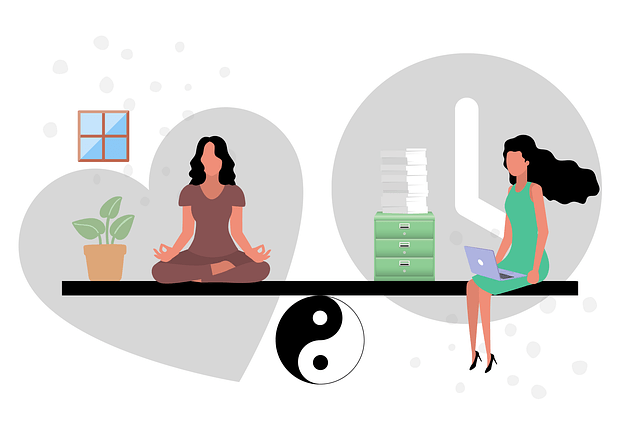
Still trying to figure out what a healthy work – life balance means to you? Read on…
Work-life balance refers to the art of effectively dividing your time and energy between your professional commitments and other significant aspects of your life. It encompasses the skillful management of a thriving career while fulfilling personal responsibilities and priorities. Despite being a desirable objective, achieving a harmonious equilibrium between work and personal life can often feel like an elusive and unattainable feat for many individuals in professional settings. Nonetheless, by adopting a purposeful mindset and establishing clear boundaries, it is indeed possible to create a greater sense of harmony and equilibrium between work and personal life. This endeavor ensures that you can minimize stress levels, while simultaneously being able to excel in your career and find fulfillment in various areas outside the confines of your workplace.
Defining the Work-Life Balance
To achieve balance in your life, the initial step involves defining what balance truly means in your unique circumstances. Start by recognizing and acknowledging your various roles, be it as a parent, spouse/partner, friend, caregiver, or hobbyist. Additionally, take some time to deeply contemplate your aspirations and minimum requirements in each role. This includes considering the desired amount of quality time you wish to dedicate to your loved ones, the activities that bring you joy and energy, as well as ensuring ample self-care. By doing so, you will gain valuable clarity on your priorities, enabling you to navigate the path of balance with a clearer understanding of the plan you will need to implement.
Now, let’s dive deeper into exploring the flexibility that exists within your job duties and hours. Are there any possibilities for adjusting your tasks and work schedule to optimize both productivity and satisfaction at work, while also freeing up time for other important aspects of your life? It’s crucial to define what your specific workplace needs and personal priorities are, as this will allow you to strike the right balance that leads to success and fulfillment in all areas of your life. Remember, balance looks different for everyone, and that’s perfectly alright.
Setting Boundaries
Once you have identified the perfect equilibrium that allows you to balance your personal and professional life effectively, it becomes crucial to establish clear boundaries that help you maintain that equilibrium. Let’s say, for instance, you make a commitment to wrap up work by 6 PM every day so that you can have dinner with your family. However, there will be instances where unexpected deadlines arise, testing your resolve to uphold your commitment. In such situations, it is vital to muster up the willpower to stick to your decision and leave the office on time. By having non-negotiable personal commitments, you create a system that demands discipline and compels you to prioritize maintaining that balance.
In order to safeguard your personal time and create a healthy work-life balance, it is essential to establish clear boundaries around email and communication. One effective way to achieve this is by refraining from responding to messages after 8 PM. Additionally, it is beneficial to inform your colleagues about the times you are unavailable by marking them on your calendar. Furthermore, learning to say no to additional projects that may encroach upon your existing priorities is important. By assertively voicing your boundaries and firmly protecting your time, you ultimately earn the respect of others and create the boundaries necessary to achieve the work-life balance you seek.
Managing your Time & Energy
Balancing your time is not only about dividing it effectively but also about distributing your mental and physical energy across various aspects of your life. It entails investing your passion and dedication into your career while you are at work, and then consciously shifting gears to fully engage and be present with your loved ones. It also involves pursuing hobbies and activities that help you relax and rejuvenate while providing inspiration. To manage stress, it is important to incorporate regular exercise into your routine. Additionally, paying attention to the signals from your mind and body is crucial in recognizing when rest is needed. Remember, your energy is a valuable and limited resource, and it should be utilized with purpose and intention.
Marketing manager Amanda finds that playing the piano in the evenings helps to stimulate her creative thinking and ideas. As a result, she feels more energized, motivated, and productive at work the following day. By saving some of her energy for personal activities, Amanda ensures that she has enough reserves to excel in her career. Amanda’s passion for playing the piano not only serves as a creative outlet but also provides her with a valuable opportunity to decompress from the daily stresses of life.
Evaluating Tradeoffs
Finding the perfect balance between work and life is a perpetual challenge that many encounter. There are instances where the demands of one’s profession escalate, necessitating a greater investment in that realm. On the other hand, personal obligations or desires may arise, leading individuals to prioritize their personal lives and temporarily reducing their work commitments. This continuous dynamic of adjusting and readjusting is an inevitable reality for most people.
When you find yourself feeling unbalanced, it is important to honestly assess the tradeoffs that need to be made. For instance, if there is a significant project that requires you to work long hours, it is crucial to communicate this to your loved ones and consider postponing certain personal commitments temporarily. On the other hand, if a family member becomes ill, it is important to have open discussions about taking time off or arranging a flexible schedule in order to provide support and be present. By openly communicating about shifting priorities, you can make the necessary compromises that will enable you to regain balance in your life.
Reassessing Over Time
As situations and circumstances continue to change and evolve, it is important to regularly reassess and adjust your priorities regarding work-life balance. It is evident that the needs and demands of individuals vary depending on their current life stages. For instance, parents of newborns require more flexibility and support compared to empty nesters who have more freedom to focus on their own interests. Similarly, a career transition or change may significantly impact the demands and expectations in the workplace. Additionally, health conditions or personal well-being may necessitate the incorporation of extra self-care practices. To ensure a healthy and harmonious work-life balance you must consider all the variables that pertain to your particular circumstances.
Conclusion
Finding a balance between work and personal life necessitates recognizing the importance of your individual and vocational responsibilities and subsequently establishing limits to safeguard them. However, by approaching this endeavor with purpose, self-control, and effective communication, you can discover a harmonious equilibrium that empowers you to flourish in various aspects of your life. This not only diminishes stress but also fosters a heightened sense of fulfillment in your professional pursuits. When you delve deeply into the intricacies of achieving work-life balance, it becomes evident that comprehending the importance of your priorities is essential to reaching the work-life balance that best suits your life.
Remember that achieving balance in life is not a one-time accomplishment, but rather an ongoing process that requires constant adjustments. It’s important to understand that perfection should not be your ultimate goal; instead, focus on enriching your overall experience. By practicing the art of balance between your work and personal life, you can greatly improve your mental well-being, relationships, productivity, and overall satisfaction in both spheres. When your various roles are harmoniously aligned with your deeper purpose, they can seamlessly complement each other instead of competing. By embracing mindfulness and being resolute in living according to your values, you have the power to create a profoundly fulfilling and significant life both within and outside of work.









